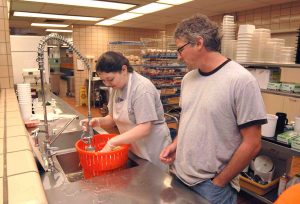Ashley Nickle of The Packer wrote in Oct. 2019 (did I mention the bit about catch up, 8 broken ribs and a broken collarbone) PMA chief science and technology officer Bob Whitaker gave an impassioned presentation at Fresh Summit on the improvements that need to be made in food safety across the industry. Ten years after the formation of the Center for Produce Safety, companies can’t assert anymore that there isn’t relevant research to inform practices, Whitaker said.
Whitaker gave specific examples of potentially risky practices that are common. He mentioned setting harvest containers on the ground before they’re filled, and spoke about relying on the presence of generic E. coli in agricultural water to indicate pathogenic E. coli, along with several other examples.
 Whitaker encourages companies to get competitive on food safety if that will get them to push past the status quo. He urged industry members to consider the costs when outbreaks happen, and he mentioned the death of a toddler during the 2006 outbreak linked to spinach.
Whitaker encourages companies to get competitive on food safety if that will get them to push past the status quo. He urged industry members to consider the costs when outbreaks happen, and he mentioned the death of a toddler during the 2006 outbreak linked to spinach.
“If we look at the recent issues we’ve had, we had an issue that involved water,” Whitaker said. “People said, ‘Well, we measured the water, we looked at generic E. coli.’ Well yeah, but the research has told us for years that generic E. coli does not represent the presence of pathogenic E. coli or salmonella. And In fact, at the volumes we do, we’re not going to find it.
“We also know that in every water system we’ve looked at around the U.S., I don’t care what crop, it has nothing to do with crop, every place the researchers have looked at and we’ve had a concentrated effort, we found contamination in open water sources — back east, out west, up north, doesn’t make a difference,” Whitaker said. “That’s where it is.”
Growing near concentrated animal feeding operations is another practice that the research indicates carries some risk.
“We know that dust will make the stuff travel,” Whitaker said. “Now we don’t know how far, but we know the one experiment that was done went out to 600 and it was there, so maybe it went farther …”
He also noted several practices in the field that he described as problematic yet commonplace.
“If I had a nickel for every picture I get every summer of people showing me Port-A-Johns being serviced in the field next to a harvest crop, I could have retired a couple years ago,” said Whitaker, who plans to retire from PMA in January.
 “Don’t tell me it doesn’t drip, and then we wonder how we get some of these things like parasites in our fields,” Whitaker said.
“Don’t tell me it doesn’t drip, and then we wonder how we get some of these things like parasites in our fields,” Whitaker said.
He mentioned harvest sleds being left in the field overnight with the day’s debris still on them as another potential problem.
“I’m seeing companies now breaking away from what everybody else is doing and say, ‘You know what, this is what we’re going to do,’” Whitaker said. “And we’ve always abhorred that idea. We’ve always said that food safety is something we share with each other, we don’t compete on it.
“To hell with that,” Whitaker said. “One thing this industry knows how to do is compete … You’ve always been marketing it anyway — you know you have. I see the stories. I see myself show up in people’s marketing things to their customers. I know that they’re marketing that.
“So do it,” Whitaker said. “If that’s what it’s going to take to get better, to create competition to get better, then do it. Because that’s what we need to do. We need the impetus to do it.”
